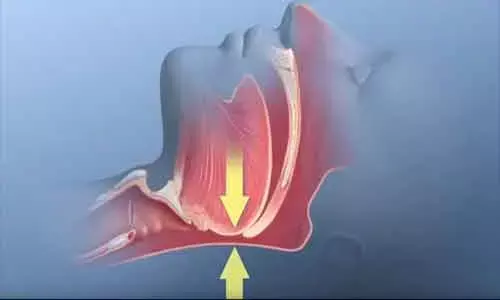- Home
- Medical news & Guidelines
- Anesthesiology
- Cardiology and CTVS
- Critical Care
- Dentistry
- Dermatology
- Diabetes and Endocrinology
- ENT
- Gastroenterology
- Medicine
- Nephrology
- Neurology
- Obstretics-Gynaecology
- Oncology
- Ophthalmology
- Orthopaedics
- Pediatrics-Neonatology
- Psychiatry
- Pulmonology
- Radiology
- Surgery
- Urology
- Laboratory Medicine
- Diet
- Nursing
- Paramedical
- Physiotherapy
- Health news
- Fact Check
- Bone Health Fact Check
- Brain Health Fact Check
- Cancer Related Fact Check
- Child Care Fact Check
- Dental and oral health fact check
- Diabetes and metabolic health fact check
- Diet and Nutrition Fact Check
- Eye and ENT Care Fact Check
- Fitness fact check
- Gut health fact check
- Heart health fact check
- Kidney health fact check
- Medical education fact check
- Men's health fact check
- Respiratory fact check
- Skin and hair care fact check
- Vaccine and Immunization fact check
- Women's health fact check
- AYUSH
- State News
- Andaman and Nicobar Islands
- Andhra Pradesh
- Arunachal Pradesh
- Assam
- Bihar
- Chandigarh
- Chattisgarh
- Dadra and Nagar Haveli
- Daman and Diu
- Delhi
- Goa
- Gujarat
- Haryana
- Himachal Pradesh
- Jammu & Kashmir
- Jharkhand
- Karnataka
- Kerala
- Ladakh
- Lakshadweep
- Madhya Pradesh
- Maharashtra
- Manipur
- Meghalaya
- Mizoram
- Nagaland
- Odisha
- Puducherry
- Punjab
- Rajasthan
- Sikkim
- Tamil Nadu
- Telangana
- Tripura
- Uttar Pradesh
- Uttrakhand
- West Bengal
- Medical Education
- Industry
Childhood obstructive sleep apnea tied to higher risk of adverse systolic BP outcomes: Study

China: A new study carried out by Sizhi Ai and colleagues found that moderate-to-severe childhood obstructive sleep apnea (OSA) is closely linked to worse systolic blood pressure (SBP) outcomes. The findings of this study were published in the journal Sleep Medicine Reviews.
All ages are affected by the widespread sleep problem known as obstructive sleep apnea. The incidence is 3%–5% in children and 9%–38% in adults, according to reports. Due to its link to cardiovascular, metabolic, and neurobehavioral problems, it is a significant illness. Studies have repeatedly shown that both children and adults with OSA have high blood pressure (BP), a known risk factor for severe cardiovascular and cerebrovascular outcomes.
Adults with obstructive sleep apnea have a known increased risk of elevated blood pressure (BP). It's still unknown, though, whether toddlers and teenagers would exhibit the same association. Therefore, to assess the relationships between childhood obstructive sleep apnea and blood pressure outcomes, researchers carried out a systematic review and meta-analysis of observational data.
To locate pertinent cross-sectional and longitudinal research up to July 6, 2021, a thorough literature search was conducted for this study. The final analysis included a total of 12 cross-sectional studies and 2 cohort studies out of the 4902 identified publications.
The key findings of this study were :
1. In the cross-sectional studies, children with mild or moderate-to-severe OSA had substantially higher mean systolic blood pressure (SBP) than healthy controls, and these effects were particularly prominent at night.
2. According to prospective research, having moderate-to-severe OSA as a kid increases the likelihood of having high SBP as an adult (mean difference: 4.02 mm Hg).
The overall cardiovascular health of children, adolescents, and maybe future adults' may be improved by early intervention for diagnosis and therapy to resolve obstructive sleep apnea.
Reference:
Ai, S., Li, Z., Wang, S., Chen, S., Chan, J. W., Au, C. T., Bao, Y., Li, A. M., Zhang, J., Chan, K. C.-C., & Wing, Y.-K. (2022). Blood pressure and childhood obstructive sleep apnea: A systematic review and meta-analysis. In Sleep Medicine Reviews (Vol. 65, p. 101663). Elsevier BV. https://doi.org/10.1016/j.smrv.2022.101663
Neuroscience Masters graduate
Jacinthlyn Sylvia, a Neuroscience Master's graduate from Chennai has worked extensively in deciphering the neurobiology of cognition and motor control in aging. She also has spread-out exposure to Neurosurgery from her Bachelor’s. She is currently involved in active Neuro-Oncology research. She is an upcoming neuroscientist with a fiery passion for writing. Her news cover at Medical Dialogues feature recent discoveries and updates from the healthcare and biomedical research fields. She can be reached at editorial@medicaldialogues.in
Dr Kamal Kant Kohli-MBBS, DTCD- a chest specialist with more than 30 years of practice and a flair for writing clinical articles, Dr Kamal Kant Kohli joined Medical Dialogues as a Chief Editor of Medical News. Besides writing articles, as an editor, he proofreads and verifies all the medical content published on Medical Dialogues including those coming from journals, studies,medical conferences,guidelines etc. Email: drkohli@medicaldialogues.in. Contact no. 011-43720751


